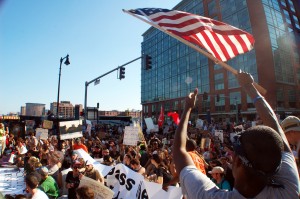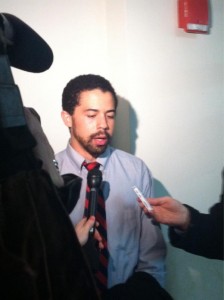
Photo by Kara Korab
For two months, Occupy Boston has been encamped in Dewey Square, across the street from the Boston branch of the Federal Reserve. Today, we are at Suffolk Superior Court to defend our right to that encampment. The Commonwealth is concerned with the character of our speech, but our words and actions cannot be understood separate from the extraordinary circumstances which summon them. The former are a matter of interpretation, the latter are not.
It is not a question if, in the aftermath of the financial crisis, the Federal Reserve provided trillions of low-cost loans to giant, insolvent financial institutions and then hid this information from our elected representatives. It is not up for debate that these same institutions proceeded to lie, openly and consistently to their shareholders, to Congress, and to the American people, about the extent of their failure while the Fed actively lobbied for a further taxpayer investment on their behalf. It is not a matter of interpretation that members of Congress charged with regulating these organizations were knowingly denied access to a full understanding of their perfidy and the willingness of Federal Reserve to underwrite it.
What is a question is how many families would have kept their homes had they been able to borrow at rates as low as those lavished on banks in secret. It is unknown how many jobs would have been saved had small businesses been allowed to sell seven hundred billion dollars of bad decisions back to the American government. It is unclear how many of the lives irrevocably damaged by our devastated economy would have fared better had they received the same consideration as the desire for JPMorgan, Bank of America, Citigroup, Wells Fargo, and Goldman Sachs and Morgan Stanley to pay their employees no less after the bailouts than they did beforehand.
There has been much concern over the refusal of the occupation to state clearly the nature of its political ideology. We offer that a sober assessment of the current situation explains this silence. One does not have to be a Republican to be outraged at the pointed destruction of the competitive market by the Federal Reserve. Just as one does not have to be a Democrat to be disgusted by the 51 cases in the past 15 years in which 19 Wall Street firms repeatedly violated antifraud laws they had agreed, also repeatedly, never to breach. Indeed, one need not even be an American to be roused to the defense of democracy against the systematic collusion of high-finance and those who we pay to regulate it. No political identity is necessary when the reality is unacceptable by any standard.
But here in Boston we are Americans, raised over a lifetime to revere the principle that government derives its authority not from the largest corporations or the wealthiest individuals, but from the consent of the governed. And that any government that maintains its authority otherwise cannot be called just. The occupation of Dewey Square is an attempt, however imperfect, to once again locate a government of the people, by the people and for the people at the center of those corporations and institutions that have profited by its larger destruction. Our encampment is the only means to this end.
Fifty-six years ago today, a forty-two year old woman named Rosa Parks was arrested for refusing to surrender her seat to a man born a different color than herself. She knew the law and broke it willingly, because she knew that she was right and that the law was wrong. But the movement that inspired her did not only seek the repeal of this law, of that prohibition, but the end of an entire culture of injustice. A culture that decreed, against all human reason and sympathy, that certain people were innately more deserving than others. This struggle continues.
Today the banks justify their salvation by the American taxpayer by claiming that they too, are better than others, and that to hold them accountable would amount to punishing success. We now know how craven a lie this is. They are not better, merely better connected; they are not more efficient, just more deceitful, and their size only signifies the scope of their greed. At Occupy Boston, we have endeavored to create a community that does not recognize position, deceit and greed as the measure of success. We have attempted to prioritize human needs – food, clothing, shelter, the freedom of speech and assembly – so as to highlight their betrayal by those working around us.
Many people have expressed support for these goals, including the Mayor, who has repeatedly said that he understands our cause. We wonder: if he so understands, why he has not opened an investigation into what goes on inside the tall buildings that surround our little camp? When Bank of America was defrauding schools, hospitals, and dozens of state and local governments via illegal activities involving municipal bond sales, did he send the police to remove them? Does he believe that their crimes were less damaging to the health and welfare of the public than our winterized tents?
The General Assembly has approved $12,000 for the purchase of these safer, warmer tents, along with a detailed plan for assuring the safety of all occupiers through the winter. A shipment of these tents was recently seized as contraband by the Boston Police Department. Despite complaining avidly to the press about threats to public safety, the City has not sent any notices to our PO Box, posted any communications on our message boards, or appeared at our General Assemblies to relay those concerns to us. These are facts.
Yesterday, the Federal Reserve announced it was reducing the price of borrowing dollars in foreign countries. This is once again a response to a crisis provoked by irresponsible behavior on the part of the banks and their allies in governments throughout the industrialized world. In Greece, democracy itself has been suspended to better ensure the servicing of international finance. The occupation in Boston, like others around the world, is a response to these threats to our democracy, and it will continue so long as they do.
We are the 99 percent, and we are no longer silent.





